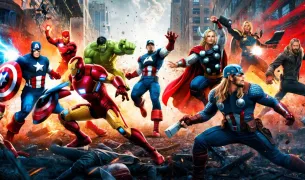In an age where Disney's animated tales are synonymous with childhood nostalgia and iconic storytelling, one would hope that their newest film, "Wish," would capture that enchanting essence we've all come to love. With its beautiful blend of CGI and hand-drawn aesthetics, the movie promises a visual treat and beckons us into the world of Rosas, a place where magic and wishes intertwine in the life of young Asha and King Magnifico. Our introduction to "Wish" invites us to discover whether this star-studded offering, featuring talents like Ariana DeBose and Chris Pine, can fulfill the audience's desires for a story with soul, substance, and the classic Disney charm.
The premise of "Wish" weaves a narrative around the concept of wishes and the power they hold. Asha, the 17-year-old protagonist, hopes for the granting of her grandfather's lifelong desire while learning of the less-than-majestic truth behind King Magnifico's wish-hoarding ways. Here begins a cinematic journey that endeavors to explore the responsibility of power, the importance of self-belief, and the universal yearning for genuine fulfillment.
The Sparkling Façade with Underlying Flaws
While "Wish" may initially enchant viewers with its vibrant animation and ambitious themes, the film's execution remains subject to scrutiny. The Kingdom of Rosas, although visually appealing, lacks the narrative depth and cultural richness that audiences have come to expect from Disney worlds. Asha's character journey, too, encounters turbulence in its pacing and clarity. The moment she harnesses the power of the wishing star raises questions about the mechanics of her transformation, destabilizing the immersive experience for viewers seeking a coherent tale.
Another contention arises from how the film presents its core messages. The symbolism of King Magnifico's greed, enveloped in a green color palette, maybe an attempt at a critique of materialism and power. However, this feels paradoxical coming from Disney, a corporation not unfamiliar with similar criticisms. The irony does not go unnoticed and may incite viewer skepticism regarding the sincerity of the film’s moral compass. Furthermore, the portrayal of animals in the narrative follows a slightly unconventional route, empowering rather than assisting our protagonist, which, while refreshing, isn't enough to mask other storytelling inconsistencies.
The soundtrack, albeit crafted by notable composers like Dave Metzger and Julia Michaels, seems to lack the infectious allure of Disney's biggest hits. It's telling when the film's potential stage adaptation feels like a more enticing prospect than its source material, suggesting a veneer of commercial interests that overshadows creative integrity. "Wish" finds itself in a conundrum, sculpted more by consumer-driven strategies than the heartfelt storytelling that once characterized the Disney renaissance.
Mixed Reactions Leave Disney Wishing for More
As the credits roll on "Wish," viewer impressions are as varied as the colors that paint Rosas. Younger audiences may find pleasure in the fantastical elements and light-hearted antics of animal companions; one can envision children being captivated by the vibrant scenes and lively characters. Yet, for the more discerning eye, the film skims the surface of its potential profundity, and this dissonance resonates in the audience's reception.
For families seeking to relive the magic of Disney's glory days, "Wish" offers fleeting moments of joy, overshadowed by the sensation of an unfulfilled promise. Disney veterans may find themselves longing for the captivating narratives and melodies that once defined the brand. Parents and children emerge with an array of opinions, from admiration for the animated artistry to forgettable indifference toward the generic storyline.
Ultimately, "Wish" challenges in an era where audiences crave substance as much as spectacle. It highlights the struggle to balance commercial objectives with genuine storytelling. As the company continues to navigate the shifting landscapes of entertainment, the question remains whether it can conjure the timeless magic that once made Disney a harbinger of dreams or if it will continue to elicit wishes from its audiences for something more authentic and heartfelt.





